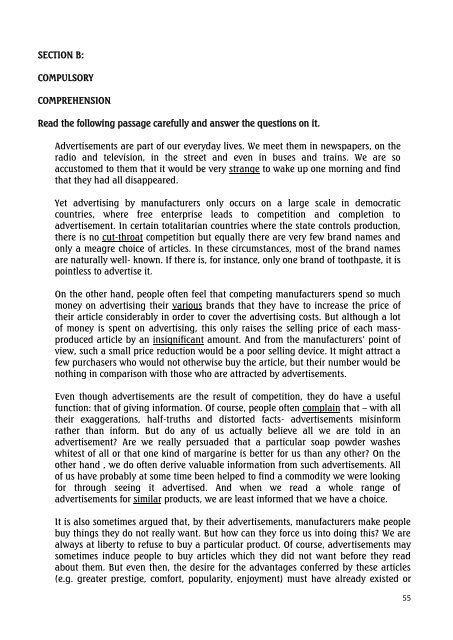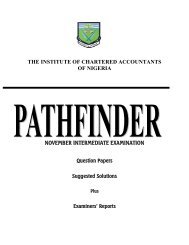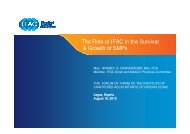atswa pilot questions answers part i - The Institute of Chartered ...
atswa pilot questions answers part i - The Institute of Chartered ...
atswa pilot questions answers part i - The Institute of Chartered ...
You also want an ePaper? Increase the reach of your titles
YUMPU automatically turns print PDFs into web optimized ePapers that Google loves.
SECTION B:<br />
COMPULSORY<br />
COMPREHENSION<br />
Read the following passage carefully and answer the <strong>questions</strong> on it.<br />
Advertisements are <strong>part</strong> <strong>of</strong> our everyday lives. We meet them in newspapers, on the<br />
radio and television, in the street and even in buses and trains. We are so<br />
accustomed to them that it would be very strange to wake up one morning and find<br />
that they had all disappeared.<br />
Yet advertising by manufacturers only occurs on a large scale in democratic<br />
countries, where free enterprise leads to competition and completion to<br />
advertisement. In certain totalitarian countries where the state controls production,<br />
there is no cut-throat competition but equally there are very few brand names and<br />
only a meagre choice <strong>of</strong> articles. In these circumstances, most <strong>of</strong> the brand names<br />
are naturally well- known. If there is, for instance, only one brand <strong>of</strong> toothpaste, it is<br />
pointless to advertise it.<br />
On the other hand, people <strong>of</strong>ten feel that competing manufacturers spend so much<br />
money on advertising their various brands that they have to increase the price <strong>of</strong><br />
their article considerably in order to cover the advertising costs. But although a lot<br />
<strong>of</strong> money is spent on advertising, this only raises the selling price <strong>of</strong> each massproduced<br />
article by an insignificant amount. And from the manufacturers‟ point <strong>of</strong><br />
view, such a small price reduction would be a poor selling device. It might attract a<br />
few purchasers who would not otherwise buy the article, but their number would be<br />
nothing in comparison with those who are attracted by advertisements.<br />
Even though advertisements are the result <strong>of</strong> competition, they do have a useful<br />
function: that <strong>of</strong> giving information. Of course, people <strong>of</strong>ten complain that – with all<br />
their exaggerations, half-truths and distorted facts- advertisements misinform<br />
rather than inform. But do any <strong>of</strong> us actually believe all we are told in an<br />
advertisement? Are we really persuaded that a <strong>part</strong>icular soap powder washes<br />
whitest <strong>of</strong> all or that one kind <strong>of</strong> margarine is better for us than any other? On the<br />
other hand , we do <strong>of</strong>ten derive valuable information from such advertisements. All<br />
<strong>of</strong> us have probably at some time been helped to find a commodity we were looking<br />
for through seeing it advertised. And when we read a whole range <strong>of</strong><br />
advertisements for similar products, we are least informed that we have a choice.<br />
It is also sometimes argued that, by their advertisements, manufacturers make people<br />
buy things they do not really want. But how can they force us into doing this? We are<br />
always at liberty to refuse to buy a <strong>part</strong>icular product. Of course, advertisements may<br />
sometimes induce people to buy articles which they did not want before they read<br />
about them. But even then, the desire for the advantages conferred by these articles<br />
(e.g. greater prestige, comfort, popularity, enjoyment) must have already existed or<br />
55

















